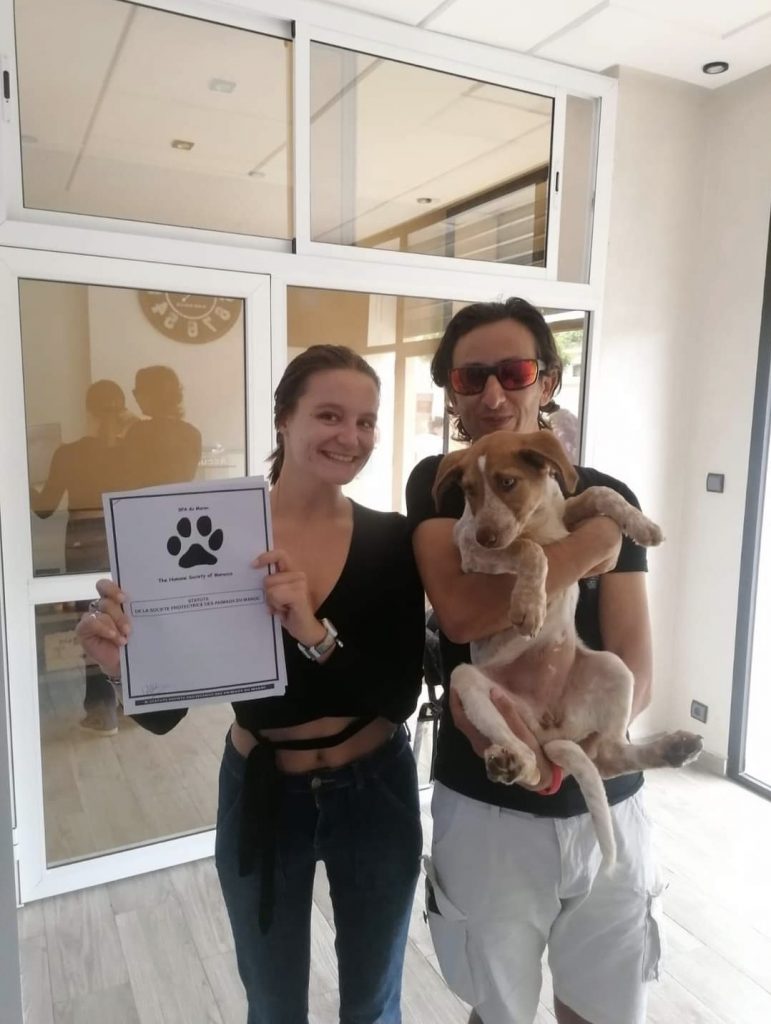摩洛哥人道协会 (SPA du Maroc) 是一家注册慈善组织,致力于促进人与动物的联系以及对所有动物的人道对待。
我们致力于创建一个基于同情心和共同责任的真正人道社会。我们设想一个社区,其中每只伴侣动物都有一个家——一个人们高度尊重和关心他们的动物和所有其他动物的社区。我们的基本信念是,当人们受到善意和理解的对待,并且拥有足够的信息和资源时,人们就会为动物做出正确的决定。
摩洛哥人道协会坚信,应该通过创建新的、充满爱心的家庭来努力改善我们的社区,并建设一个不再有无家可归和不需要的动物的世界。这是一个持续的过程——对于我们能够与新家庭建立联系的每一只动物,另一只需要帮助的动物就会来到我们身边。
作为一家私人非营利组织,HSM 依靠动物爱好者的慷慨支持、赠款、遗赠和服务费。 HSM 不隶属于任何其他动物福利组织,我们不接受政府资助。

我们以动物权利理念为指导,致力于为我们照顾的动物和我们支持的社区寻求尽可能最好的结果。
2020 年,董事会以及由总裁兼创始人 Ali Izddine 领导的全新领导团队承诺我们的组织将成为一个全新的组织。我们致力于成为一个真正的社区驱动的动物福利组织,在采用和开发动物福利最佳实践方面遵循甚至领导。我们知道,很多工作都是从社区开始的,并且坚定地致力于与合作伙伴组织、政府机构和相关社区成员合作。
我们设想未来所有动物都可以获得健康、有意义的生活所需的支持、照顾和人际关系。
以下摩洛哥人道协会立场声明已于 2022 年 2 月 4 日获得 HSM 董事会批准
所谓的管理 “害虫动物”:
摩洛哥人道协会反对不人道的方法 “害虫” 控制不会立即死亡的情况。摩洛哥人道协会鼓励使用非致命方法来预防和管理被归类为 “害虫” 只要有可能。
扑杀狗的立场声明:
摩洛哥人道协会认识到大群流浪狗可能给社区成员,尤其是儿童带来的问题。扑杀狗主要发生在狗咬伤事件之后;射杀自由漫步的狗是为了减少狗的总体数量并改善公共安全。摩洛哥人道协会强烈反对将扑杀狗作为人口控制和社区安全措施的一种方法。我们提倡人道的狗群管理方法,社区领导必须采用 TNVR(诱捕-绝育-疫苗接种-释放)作为减少摩洛哥流浪狗数量并保护公众健康的唯一方法。我们坚信,单一健康方法是控制狂犬病的最佳方法,扑杀狗不是答案,但专门定制的管理计划才是解决方案。安乐死作为一种人道诱导死亡的行为,只有在没有其他选择(无法治愈的疾病或伤害)时才必须采用。摩洛哥人道协会正在努力减少社区获得人道犬只数量管理方法的障碍,以消除社区扑杀犬只的需要。
犬只数量管理立场声明:
摩洛哥人道协会认识到狗群管理的必要性。作为一个动物福利组织,摩洛哥人道协会支持人道的犬只种群管理策略,从而改善犬只福利和人类福祉,并且从长远来看是可持续的。摩洛哥人道协会旨在与社区领导和成员建立基于信任的长期关系。关于人道犬只数量管理策略,摩洛哥人道协会采取以下立场:
消毒:
摩洛哥人道协会坚决支持由经验丰富的兽医使用适当的麻醉和镇痛对狗、猫和兔子进行绝育手术。摩洛哥人道协会认为,绝育对于负责任的宠物饲养至关重要。所有从摩洛哥人道协会领养的狗、猫和兔子在被领养到新家之前都会经过绝育。
安乐死:
摩洛哥人道协会反对使用安乐死作为控制人口的方法。摩洛哥人道协会尽一切努力避免对动物实施安乐死,并且只采用公认的人道方法来做到这一点。
摩洛哥人道协会遵循不杀戮的理念,其基础是拯救所有来到我们身边的动物。我们相信,在我们的社区中,任何健康、可治疗、行为健全的动物都不应该被安乐死。我们只对预后不良、生活质量受到损害或对公共安全构成威胁的动物保留安乐死。我们正在通过支持其他协会和那些协会来努力实现这一目标。我们对这一理念的承诺体现在我们所照顾的动物的活体释放率达到 99.9%。通过围绕我们的四大重点支柱(即预防、保留、安置和教育)开展规划和活动,我们可以取得这一优异成果。
宠物饲养:
摩洛哥人道协会反对纯粹为了盈利而没有适当考虑动物健康和安全的宠物饲养。 这样的例子包括后院饲养员和大型幼犬加工厂,他们追求经济利益而不是个体动物的福祉。
虐待动物登记处是保护动物免受伤害的重要执法工具和筛查机制。摩洛哥人道协会支持建立国家动物虐待登记处,并呼吁各级政府共同努力,建立一个可供执法部门和向公众出售或提议收养动物的组织(例如,动物收容所和宠物商店)。
断尾:
摩洛哥人道协会反对出于美观或展示目的而对犬类进行断尾,但不反对在医疗上必要时由经过认证的兽医进行断尾。
剪穗:
摩洛哥人道协会反对出于美观或展示目的对狗进行剪耳,但不反对在医疗上必要且由经过认证的兽医进行的剪耳。
动物识别方法:
摩洛哥人道协会支持对犬科动物和猫科动物的耳朵进行纹身作为永久识别手段,但前提是必须由经过认证的兽医专业人员使用适当的麻醉和镇痛方法进行。摩洛哥人道协会不支持使用夹子纹身作为身份识别手段。
摩洛哥人道协会支持在犬科动物和猫科动物皮下植入微芯片的做法,作为永久识别的手段,但只有由经过认证的兽医专业人员进行,并建议使用适当的麻醉和镇痛方法。
农场动物的集中隔离:
摩洛哥人道协会反对工业化农业中的密集监禁做法。在这种做法中,成百上千个物种通常被安置在一个区域内,它们移动、行走或表现自然行为的能力受到极大限制。
关于野生动物、外来宠物和演示的立场声明:
2021 年 11 月获得 HSM 董事会批准
摩洛哥人道协会支持限制可作为宠物饲养的外来动物的数量和类型。此外,摩洛哥人道协会强烈反对出于娱乐或陪伴目的而圈养野生动物。我们的组织继续倡导为所有作为宠物饲养的动物(无论物种如何)提供尽可能最高的福利标准。由于许多外来动物有复杂且高度具体的饲养需求,我们鼓励潜在的主人向那些已被证明在人类照料下能够茁壮成长的动物寻求陪伴。
摩洛哥人道协会不支持在旅行展示、教育演示或娱乐目的中运输和使用外来动物。外来动物不仅在互动过程中构成公共安全风险,而且还迫使非驯化物种在不自然、会产生压力的环境中展示。摩洛哥人道协会认为,在非常规环境中处理和展示外来动物会促进对复杂、被误解、有时甚至是危险动物的所有权,而不是保护。
摩洛哥人道协会反对在摩洛哥饲养动物以获取毛皮。
以下 HSM 立场声明已于 2021 年 7 月 5 日获得 HSM 董事会批准
马车马/马 & 骑骆驼:
摩洛哥人道协会反对使用马车、小马或骆驼进行娱乐。全国范围内出现的大量报道显示,拉车的马因疲劳而倒下,以及退役的拉车的马在马匹拍卖会上被肉类买家竞标。
马匹出口:
摩洛哥人道协会反对将专门饲养的挽马活体出口到日本等国际目的地供人类消费。
马 & 驴屠宰:
摩洛哥人道协会反对在摩洛哥境内通过拍卖购买马和驴进行屠宰。购买的马包括受损马、老年马和伴侣马,它们通常要长途跋涉前往摩洛哥国家批准的屠宰场。摩洛哥人道协会认为,该行业监管不够严格,因此有可能造成严重的人类健康风险和严重的马匹福利问题。
PMU 农业:
摩洛哥人道协会反对将母马怀孕并在其整个怀孕期间限制在马厩内的做法,以收集其尿液(怀孕马尿)用于制药用途。
动物训练方法:
HSM 支持围绕每只动物如何处理和了解其环境的训练方法。因此,HSM 在促进友善和尊重动物福利的环境中采用人道的教学方法。
训练时,HSM 支持使用积极强化方法,例如零食和游戏奖励,但不支持引起恐惧或造成疼痛的处理方法。
HSM 反对任何导致动物身体不适或过度恐惧或焦虑的训练设备。此类示例包括防夹环、防震项圈、喷水、电围栏等。
服务性动物:
摩洛哥人道协会支持使用服务性动物,例如导盲犬和治疗犬以及情感支持动物,前提是使用积极强化方法来训练它们,并且将它们用作服务性动物不会伤害它们。摩洛哥人道协会认识到这些动物在支持整体福祉方面发挥的重要作用,并敦促各级政府实施更严格的法规来保护它们以及依赖它们的人们。
动物活动家:
2020 年 HSM 董事会批准
摩洛哥人道协会反对旨在阻止举报人揭露虐待动物行为的立法或做法,并使动物保护法的执行变得更加困难,这些法律或做法将针对那些代表动物的倡导者而减少动物的福利。摩洛哥人道协会呼吁各级政府加强动物保护法,采取有意义的措施加强这些法律的执行并保护举报人。
动物园 & 水族馆:
2020年2月17日经HSM董事会批准
摩洛哥人道协会理解,迫切需要由经认可的组织开展当地和国际保护工作,以减轻栖息地破坏和物种灭绝。因此,HSM 承认经认可的非营利性动物设施和水族馆确实可以在保护和公共教育举措中发挥作用。
HSM 对主要关注以下任务的机构表示赞赏:
摩洛哥人道协会强烈鼓励现有经认可的动物设施将其重点从展示活体动物物种作为公共教育手段转移。相反,HSM 鼓励此类设施专注于发起当地和全球动物保护举措,同时充当不可释放的野生动物和被没收的外来宠物的避难所和庇护所。
具体来说,HSM 鼓励认可的动物设施通过以下方式进行转型:
摩洛哥人道协会强烈反对展示野生动物的设施,其主要业务是从公众互动和观看展示的动物中获利。这些类型的活动在人道和相互尊重的社区中没有立足之地。
| 曲奇饼 | 期间 | 描述 |
|---|---|---|
| cookielawinfo-复选框分析 | 11个月 | This cookie is set by GDPR Cookie Consent plugin. The cookie is used to store the user consent for the cookies in the category "Analytics". |
| cookielawinfo-复选框功能 | 11个月 | The cookie is set by GDPR cookie consent to record the user consent for the cookies in the category "Functional". |
| cookielawinfo-复选框-必要 | 11个月 | This cookie is set by GDPR Cookie Consent plugin. The cookies is used to store the user consent for the cookies in the category "Necessary". |
| cookielawinfo-复选框-其他 | 11个月 | This cookie is set by GDPR Cookie Consent plugin. The cookie is used to store the user consent for the cookies in the category "Other. |
| cookielawinfo-复选框性能 | 11个月 | This cookie is set by GDPR Cookie Consent plugin. The cookie is used to store the user consent for the cookies in the category "Performance". |
| 查看的_cookie_政策 | 11个月 | 该cookie由GDPR Cookie Consent插件设置,用于存储用户是否同意使用cookie。它不存储任何个人数据。 |
在继续您的收养申请之前,请查看并接受我们的数据处理惯例:
笔记: By clicking "I Agree & Continue", you will be redirected to an external application form. This tracking system logs your interest but does not capture data from the external form.
在继续您的收养申请之前,请查看并接受我们的数据处理惯例:
笔记: By clicking "I Agree & Continue", you will be redirected to an external application form. This tracking system logs your interest but does not capture data from the external form.